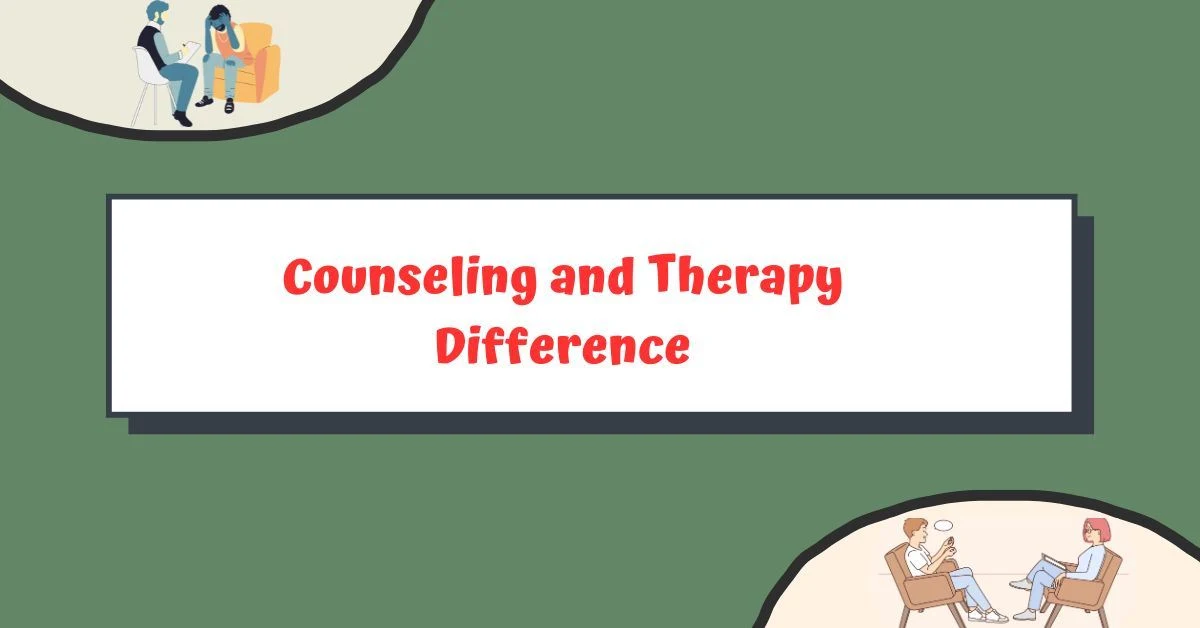Counseling and therapy difference are two related constructs but not the same thing in mental health care. This article aims to compare counseling and therapy so that anyone in need of these two services can get a clear idea.
Gaining information about them will help you choose the right one you can easily choose between them by explaining the differences and similarities of these two subjects towards appropriate mental health.
Differences Between Counseling and Therapy
Defining Counseling
Types of Counseling
There are different types of counseling for different needs which are included according to their needs. Some common ones are described below:
- Grief Counselling: It generally helps you deal with all kinds of grief, suffering, gain, and loss.
- Marriage Counselling: It usually helps in good relationships and resolves all kinds of conflicts.
- Career Counselling: It is remarkable to be effective in shaping and changing people's careers.
Focus and Goals
Counseling usually teaches all types of problem-solving and coping skills and teaches how to cope with stress effectively. The primary goal is to provide prompt solutions and advice to all types of problems.
Duration and method
Counseling is a focus of solving various problems which usually lasts for several months. Perfect for those looking for accessible advice without having to go too far.
Defining Therapy
Types of Therapy
- Cognitive Behavioral Therapy (CBT): the change of negative thought patterns.
- Psychodynamic Therapy: Exploring aspects that are unconscious thoughts and experiences. Some are presented directly and some are presented indirectly.
Focus and Goals
For example, someone can work through childhood experiences involving present relationships. digging deep into personal issues, and seeking long-term growth and insight is great therapy.
Duration and Approach
It encourages a deep dive into emotional feelings because they just encourage you to leave out the emotions until you are emotionally healed with more insight in you. Many types of therapy have a long-term commitment, months or years.
Overlapping Areas
Shared Goals
- Improved Mental Well-Being: They are both doing something about emotional health.
- Coping Skills: Either one can teach you what you can use to deal with stress and anxiety.
- Emotional Regulation: These practices also have the means to take hold of and correct emotions.
Similar Techniques
Certain techniques used in both counseling and therapy include:
- Active Listening: By listening closely, practitioners learn something more about the clients.
- Goal Setting: This gives it something to work with for the client.
When To Choose One Vs. The Other
Counseling and Therapy Difference either choose to or you don’t if you’re opting for counseling or therapy. For example:
- Counseling: For one thing, that might work better if you've got an issue (maybe you have to prep for a job interview, for instance).
- Therapy: If you want to dig into some deeper, underlying, emotional patterns (i.e. why do you continually break up in relationships) then this could be a positive thing for therapy.
Choosing the Right Path
Identifying Your Needs
You just need to figure out what route is best for you, and you’ve got to self-assess. Look at what problems you need to solve, and the location you need to take the project.
Asking the Right Questions
When seeking assistance, ask potential counselors or therapists:
- How do you treat?
- How long have you worked with one client?
Any advice you can give them, two things they couldn’t solve themselves.
Access to qualified professionals they need
To locate licensed professionals, check resources like:
- Psychology Today: A list of therapists by location linked to specialize.
- Good Therapy: Lessons & Lists of Counselors and Therapists
Conclusion
Counseling and therapy differences serve different purposes but share common goals: Instead, therapy involves more time spent developing emotionally and personally and it is longer lasting and more specific to your situation.


.jpg)